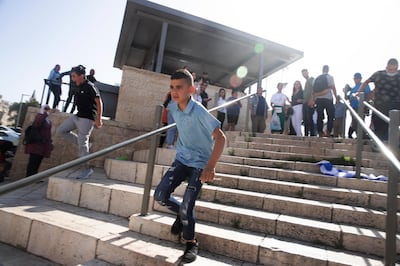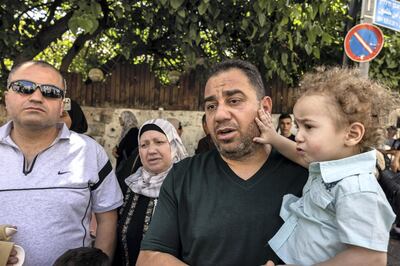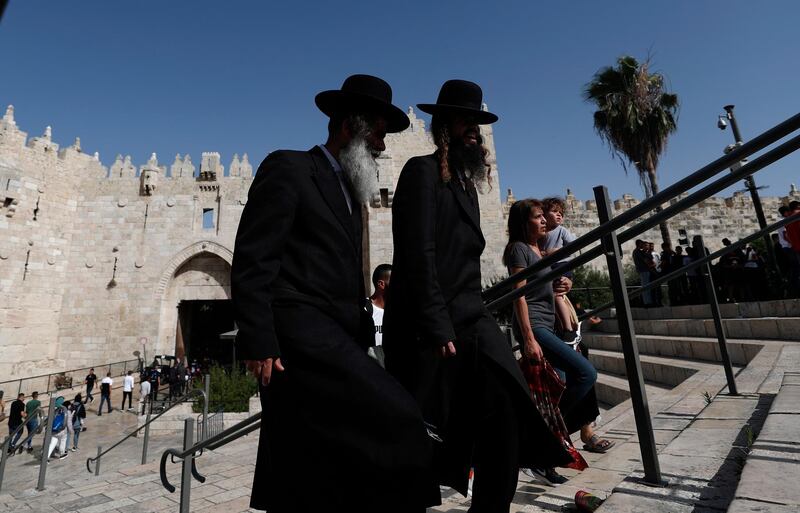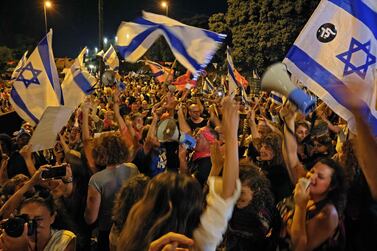While Israelis celebrated or bemoaned the new government on Sunday, Palestinians were united in indifference.
At East Jerusalem’s Damascus Gate, surrounded by amphitheatre stairs facing the tall, pointed arch, families savoured the evening breeze with ice cream and cardamon coffee. Prime Minister Naftali Bennett wasn’t part of their conversation.
The vote was part of “internal Israeli affairs”, Palestinian President Mahmoud Abbas said. “Our position has always been clear, what we want is a Palestinian state on the 1967 borders with Jerusalem as its capital."
Jerusalem is two cities within a city.
The Damascus Gate is where the city divides – between East and West, between Jews and Arabs. East Jerusalem has been occupied since 1967, with Israel fully annexing it in 1980, an act that has internationally been considered illegal.
Even the city’s name varies, with Palestinians referring to it as ‘al-Quds’, meaning ‘the Holy.’
While Israelis and Palestinians can both enter the gate, the biggest Israeli presence near the stairs is the police – stationed to the right and left of the gate.
“The [Israeli] government has made it clear that little will be different when it comes to Palestinians living under occupation," Human Right Watch’s Israel and Palestine Director Omar Shakir said. "Any move that would substantially change it would divide the government.”
Mariam Abdullah, a 56-year-old who often sits at the gate, chatting with friends said that while Israelis might benefit from the changing policies, it wouldn’t alter the Palestinians’ bigger plight.
“He won’t free us from occupation,” she said, referring to Mr Bennet.
Meanwhile, tension has been boiling in the capital, following an 11-day war with Gaza, and ahead of a flag march that Israel’s government has permitted the Jews to undertake. The rally will pass through Damascus Gate.
“Last month we received a reminder that the conflict with the Palestinians still exists,” Mr Bennett had told Parliament. “We must remember and we must remind the world that our enemies deny our very existence as a Jewish state in the Land of Israel.”
While both Israelis and Palestinians know the conflict is the biggest issue that needs resolving, past governments have largely ignored it. Both Benjamin Netanyahu and Mr Bennett have opposed the creation of a Palestinian state.
“Whether it’s his historic support for annexation or using excessive force against Palestinians, Bennett’s track record and positions are well-known,” Shakir said.
“This government will continue the status quo when it comes to Palestinians. It may be comfortable for Jewish Israelis, but it has deprived millions of Palestinians – for whom apartheid is a reality – of basic human rights.”
Jews and Arabs interact but rarely intermingle, feeling comfortable in their respective bubbles. Few Palestinians hold Israeli passports. Those who do are considered Arab Israeli, while most don’t even have travel documents. Few Palestinians participate in Israeli politics, although most are politically vociferous.

Downhill from the Old City and near the Western Wall where Jews gather to pray, lives Mona Baydoun, a 22-year-old recent university graduate. Her neighbourhood of East-Jerusalem’s Al Bustan recently faced threats of evictions and also received demolition orders, allegedly to make space for Jewish settlers and construction projects.
“If anything, the Bennett government will be worse,” she said from her living room, the terrace overlooking a hill with sprawling white houses. “Nothing will change for us and the occupation won’t be over. Maybe new wars will be fought. I am afraid.”
Ms Baydoun has a handful of Jewish friends. “Only those who stand with us”, she said, pulling up their photos on her phone.
“Few Israelis take a stance against the illegal settlements and the new government certainly doesn’t," she said.
"The government keeps spreading fear and intimidation. I am afraid passing checkpoints into the West Bank and I am even afraid sitting at home, because the police come knocking on our door, trying to evict us.”
Mr Bennett on Sunday touched on the issue, saying that he intended to “strengthen the settlements throughout the Land of Israel.”
A few days prior to the vote, Ashraf Giath, 42, stood inside one of Jerusalem’s courts, waiting for the verdict on his family’s eviction from his house – a decision that was again delayed.
“Will this prime minister stand up for me?” he asked. “He won’t. I don’t care who they are voting for.”

Still, some Jewish Israelis do stand up for Palestinians. One such is 28-year-old activist Shir Aharon Bram.
Sitting at a park overlooking Israelis celebrating the formation of the new government on Sunday, he said that since the assassination of former Prime Minister Yitzhak Rabin, who was killed by a right-wing extremist, no one has come close to any agreement with the Palestinians.
Many stood with the Palestinians in word, but more action was needed, said Mr Bram, who for the past year had joined tens of thousands of fellow protestors against Mr Netanyahu’s presidency.
“We need the same force against the war,” he said. “The Israeli-Palestinian conflict touches every sector of our society; it is the most important issue to tackle."







